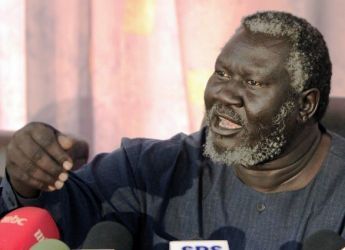SPLM-N’s Agar call to reform Sudan’s FFC coalition
April 25, 2020 (KHARTOUM) – Malik Agar, head of the SPLM-N called to reform the structures of the Forces for Freedom and Change (FFC) to enables the Sudanese Revolutionary Front (SRF) to play an effective role in Sudan’s democratic transformation.

On Saturday Agar addressed a letter to the Sudanese people on the occasion of the holy month of Ramadan which was also published by the official news agency SUNA.
He pointed to the need to maintain the unity of the revolutionary forces to achieve democratic change and defeat the forces of the counter-revolution.
“The first challenges to the transition are the unity of the forces of the revolution and the management of their differences,” he said before to add “This difference reflect the different intellectual premises of the forces of the revolution.”
He said that these differences recently led some SRF factions to express their dissatisfaction with what is happening within the broad coalition.
Agar further called for structural reforms of the FFC in such a way that the SRF becomes a “key member that works with its partners to achieve peace, contributes to achieving the goals of the glorious December Revolution and translates the slogans of the revolution into realistic policies.”
It is worth mentioning that the SRF joined the FFC under the banner of Sudan Call alliance, which also includes the NUP of Sadiq al-Mahdi Umma Party, the Sudanese Congress Party (SCoP) and civil society groups.
The umbrella of the armed groups previously demanded independent representation within the FFC after accusing the political forces inside the country of kidnapping the decision making and not involving them in any consultations on the future of the country.
Several parties of the National Consensus Forces had refused the SRF participation in the meetings on the formation of the government and the organs of the transitional period.
They justified their refusal saying that the armed movements demanded peace negotiations to address the issues of their regions.
Initially, they proposed that the SRF groups join them directly and participate in the implementation of the transitional period. Regarding the issues problems of their respective regions, they pledged to hold a national peace conference to address the root causes of the conflicts.
In a meeting held in Khartoum on 23 April, the Sudan Call alliance agreed to set a common vision for the organizational and political reform within FFC and the Sudan Call alliance alike.
(ST)
